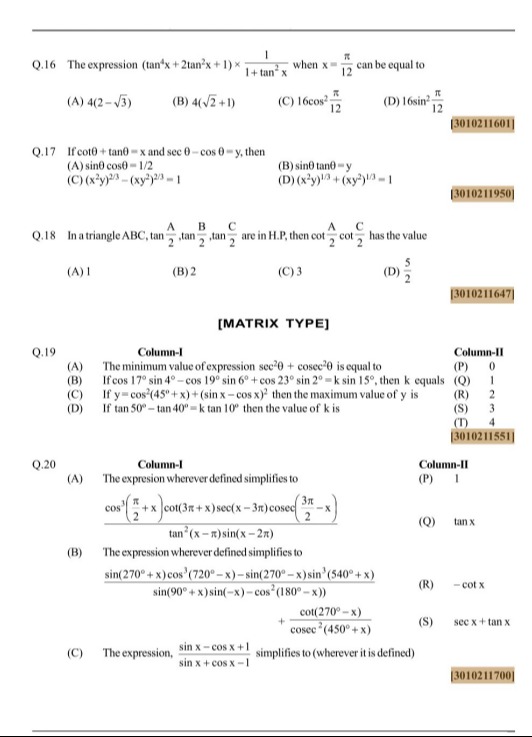Question
Question: The expression $(\tan^4x + 2\tan^2x + 1) \times \frac{1}{1+\tan^2x}$ when $x = \frac{\pi}{12}$ can b...
The expression (tan4x+2tan2x+1)×1+tan2x1 when x=12π can be equal to

4(2−3)
4(2+1)
16cos212π
16sin212π
A, D
Solution
The given expression is (tan4x+2tan2x+1)×1+tan2x1.
-
Simplify the first term: The term (tan4x+2tan2x+1) is a perfect square. Let A=tan2x. Then the expression becomes (A2+2A+1)=(A+1)2=(tan2x+1)2.
-
Use trigonometric identity: Recall the identity 1+tan2x=sec2x. So, the first term becomes (sec2x)2=sec4x. The second term is 1+tan2x1=sec2x1.
-
Combine the simplified terms: The expression simplifies to sec4x×sec2x1=sec2x.
-
Evaluate at x=12π: We need to find the value of sec2(12π). This is equivalent to cos2(12π)1. First, calculate cos(12π) (which is cos(15∘)): cos(15∘)=cos(45∘−30∘)=cos45∘cos30∘+sin45∘sin30∘ =(22)(23)+(22)(21)=46+42=46+2.
-
Calculate cos2(12π): cos2(12π)=(46+2)2=16(6)2+(2)2+262 =166+2+212=168+43=164(2+3)=42+3.
-
Calculate sec2(12π): sec2(12π)=cos2(12π)1=42+31=2+34. Rationalize the denominator: 2+34×2−32−3=22−(3)24(2−3)=4−34(2−3)=14(2−3)=4(2−3).
Thus, sec2(12π)=4(2−3).
Now let's verify the options: (A) 4(2−3) - Matches our result.
(C) 16cos212π=16×42+3=4(2+3). This is not 4(2−3).
(D) 16sin212π. Let's calculate sin2(12π). sin(15∘)=sin(45∘−30∘)=sin45∘cos30∘−cos45∘sin30∘ =(22)(23)−(22)(21)=46−2. sin2(12π)=(46−2)2=16(6)2+(2)2−262 =166+2−212=168−43=164(2−3)=42−3. So, 16sin212π=16×42−3=4(2−3). This also matches our result.
Since the question states "can be equal to", both (A) and (D) are correct.
